Kubernetes has become the backbone of modern cloud infrastructure. Whether you’re working in DevOps, Cloud Engineering, SRE, Platform Engineering, or MLOps, Kubernetes skills are no longer optional—they’re a career accelerant.
Yet many professionals still ask:
- Do I really need a Kubernetes certification?
- Which certification should I choose?
- Is it hard to prepare?
- Where do I even start?
This guide breaks down everything you need to know about Kubernetes certifications in 2025 and how WeCloudData’s hands-on training fits into your journey.
What Are Kubernetes?

Kubernetes—often called K8s—is an open-source container orchestration platform used to deploy, scale, and manage containerized applications at scale.
Cloud providers, enterprise teams, and MLOps pipelines rely on Kubernetes for:
- Automated scaling
- Rolling deployments
- Resilience & self-healing
- Resource optimization
- Running containerized workloads anywhere
It’s the industry standard for production-grade container orchestration, which is why Kubernetes certifications are so valuable.
Kubernetes Certification Paths Explained
The Cloud Native Computing Foundation (CNCF) offers several Kubernetes certifications. Here are the ones that matter most in 2025:
1. Certified Kubernetes Administrator (CKA)
The most recognized certification in the industry.
It validates your ability to:
- Install & configure clusters
- Handle deployments & networking
- Troubleshoot production issues
- Manage storage, RBAC, and cluster components
It’s performance-based, meaning you solve real problems in a live Kubernetes CLI environment.
2. Certified Kubernetes Application Developer (CKAD)
Ideal if you focus on:
- Application deployment
- Pod design
- ConfigMaps, secrets, Helm
- App debugging
This is often taken by backend engineers, Python developers, and MLOps practitioners deploying models.
3. Other Certifications
- CKS (Security) — advanced, after CKA
- KCNA (Associate-level Kubernetes basics) — for total beginners
- KCSA — security associate
CKA remains the most respected and career-boosting.
Why Get a Kubernetes Certification in 2025?
1. Kubernetes Talent Demand Is Increasing
Cloud-native adoption continues to rise. Kubernetes is now deeply integrated into:
- AWS EKS
- Azure AKS
- Google GKE
- On-prem enterprise clusters
- MLOps platforms like Kubeflow
Certified Kubernetes professionals consistently stand out in DevOps and cloud roles.
2. It Validates Practical Skills
Because the exam is hands-on, it proves you can:
- Debug real clusters
- Fix crashes and misconfigurations
- Use kubectl fluently
- Manage live workloads
Employers trust Kubernetes certifications because they measure real capability.
3. Better Job Opportunities & Salaries
Common roles requiring Kubernetes expertise:
- DevOps Engineer
- Cloud Engineer
- SRE
- Platform Engineer
- MLOps/AI Infrastructure Engineer
Many teams list “CKA preferred” on job descriptions.
Challenges & Considerations Before You Begin
Kubernetes certification isn’t difficult—but it does require structured, hands-on practice. Most learners struggle with:
- Understanding cluster internals
- CLI speed under exam time pressure
- YAML configuration
- Troubleshooting skills
- Working with real cloud-native tools
That’s why guided training, labs, and mentorship matter much more than reading documentation alone.
How to Prepare Effectively
The most efficient and beginner-friendly approach combines:
Step 1: Learn the Fundamentals (Great for Beginners)
Start with the Introduction to Kubernetes Course from WeCloudData—it gives you:
- Kubernetes basics
- Pods, deployments, services, namespaces
- Hands-on cluster practice
- Beginner-friendly explanations
- Real-world use cases from DevOps & MLOps
This course is excellent for absolute beginners or those transitioning from software, data, or cloud backgrounds.
Step 2: Build Real Projects
Practice is everything. WeCloudData students work on projects such as:
- Containerizing apps with Docker
- Deploying microservices
- Setting up auto-scaling
- Managing secrets/configs
- Logging & monitoring setup
This builds the confidence needed for the certification exam.
Step 3: Prepare Using Practice Exams
After mastering the basics, practice exams help you:
- Increase kubectl speed
- Improve YAML fluency
- Adapt to real exam tasks
- Sharpen troubleshooting skills
Students who follow this path typically succeed on the first attempt.
Is Certification Worth It? Absolutely.
A Kubernetes certification isn’t just a badge—it’s proof you can:
- Deploy and maintain production-grade clusters
- Troubleshoot real-world failures
- Work confidently with microservices
- Support cloud-native platforms and MLOps workloads
It’s one of the highest-ROI certifications in the cloud ecosystem.
How WeCloudData Supports Your Journey
For those learning K8s from scratch, WeCloudData, leading data academy in North America, Introduction to Kubernetes. A beginner-friendly kubernetes course who would like to learn it from scratch with guidance from industry experts.
For job-ready DevOps and cloud training that includes Kubernetes, Docker, CI/CD, Terraform, AWS, and more. The combination gives learners an industry-aligned pathway to mastering Kubernetes and preparing for CKA/CKAD.
FAQ: Kubernetes Certifications
1. What is the best certification for Kubernetes?
The Certified Kubernetes Administrator (CKA) is widely considered the best Kubernetes certification because it is hands-on, industry-recognized, and validates real cluster management skills for DevOps and cloud engineers.
2. How much does the Kubernetes CKA certification cost?
The CKA certification costs around $395 USD and typically includes one free retake. Prices may vary depending on discounts or training bundles.
3. What is the difference between KCNA, CKA, and CKAD?
- KCNA – Beginner-level Kubernetes and cloud-native fundamentals.
- CKA – Administrator certification for cluster setup, troubleshooting, and operations.
- CKAD – Developer-focused certification for building and deploying apps on Kubernetes.
4. Is Kubernetes certification worth it?
Yes. Kubernetes certifications are valuable for careers in DevOps, Cloud Engineering, Platform Engineering, and MLOps. They boost credibility, improve job prospects, and help professionals demonstrate real-world container orchestration skills.

